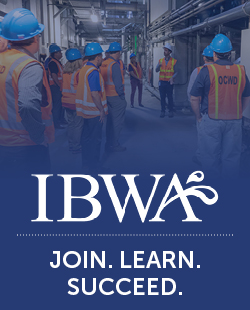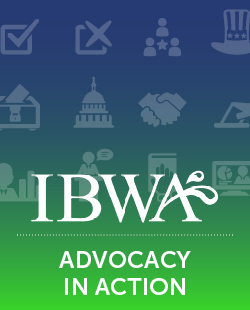Bottled Water Packaging
Bottled Water Packaging
Policy Statement
IBWA is dedicated to the comprehensive management of bottled water packaging to provide the highest quality, cost-effective, and environmentally responsible containers possible. IBWA and its members approach packaging issues in a manner emphasizing the most effective and efficient solutions to reduce the strain on the environment, while taking into account the equal responsibility of all solid waste generators. Consideration must also be given to behavioral solutions, such as public education and enforcement of existing recycling and litter control laws.
Background
Since the first Earth Day in 1970, environmental responsibility has become more than just a novel concept: it has become a part of American life. Through the years, businesses, governments and consumers have adopted more environmentally friendly practices in recognition of our duty to take responsibility for the world in which we live. Businesses and governments have implemented various measures aimed at reducing, reusing and recycling the packaging used to contain and deliver products to consumers.
Since the beginning of the current environmental movement, two programs have been considered ideal for conserving resources: 1) beverage container deposit systems (i.e., bottle bills) and 2) mandatory recycling content for certain product packaging. These programs encourage recycling and reduce litter; however, they fail to address the issues in a comprehensive manner.
IBWA recognizes the important role bottle deposit programs have played in controlling litter and incentivizing recycling. Currently, 10 states and Guam have bottle deposit programs. California, Connecticut, Guam, Hawaii, Maine, New York, and Oregon include bottled water in their programs, and Iowa, Massachusetts, Michigan, and Vermont do not. No two programs are the same and this causes significant issues among bottlers, distributors, retailers, and reclaimers. While many of these states can claim substantial recycling and redemption numbers, they often fall short on overall recycling goals.
More comprehensive solutions include public education and the implementation of curbside recycling programs as components of a successful recycling system. Curbside recycling programs accept a larger variety of materials than other solid waste programs; therefore, they divert a greater volume of solid waste from the waste stream. The convenience of curbside programs also offers consumers the ability to more easily recycle household products. The first curbside recycling program began in the early 1980s.
Recently, mandates requiring the use of recycled content have been discussed in numerous states. California is the first state to pass legislation mandating the use the recycled content for plastic beverage containers that are part of the state’s redemption program (2020). As other states look at this option, IBWA takes the necessary time to assess each proposal as all states are different in their capacity to handle implementation of a recycled content mandate. Infrastructure needs, availability of material, assessment of the current use of recycled content, and other important factors influence the development of any such mandate.
Guiding Principles of Bottled Water Packaging
IBWA believes the following set of principles should guide the industry in addressing solid waste, recycling and litter. A comprehensive approach must be utilized, emphasizing efficient and effective solutions that address the broad array of solid waste and treat all solid waste generators in an equitable manner.
Education and awareness – Behavioral approaches to solid waste reduction and litter control must be a part of any good public policy. Education of consumers, government, and industry is the key to making all parties involved responsible citizens in environmental protection. Unfortunately, there has been very little public education on recycling, at both the local and national levels, for too many years. Without some level of public education professing ways to increase personal responsibility for recycling and litter control in conjunction with other waste reduction measures, the success of such programs is severely restricted, and its purpose defeated from the outset.
Efficient, yet effective, solutions – Any attempt to increase recycling rates and/or reduce litter should be evaluated to determine whether the successful attainment of its intended goal justifies the process by which that goal is achieved. Implementing a vast bureaucracy and creating logistical and financial hardships for all parties involved to successfully capture a small amount of the total municipal solid waste stream may not be the best solution. Programs that more properly balance cost and convenience with effectiveness should be given a higher priority.
Curbside recycling programs – Curbside recycling programs offer a convenient way for the average consumer to participate in an effective recycling program. Curbside programs accept a greater variety of materials, thereby preventing a larger volume of solid waste from being sent to landfills. Non-home and office delivery (HOD) bottled water is generally sold in recyclable polyethylene terephthalate (PET) containers. While reasoned efforts should be made to increase the recycling rate of these types of materials, other categories of solid waste should be taken into account when addressing recycling rates. An expensive and cumbersome recycling effort focusing only on beverage containers, which comprise less than 5 percent of total municipal solid waste, ignores other recyclable solid waste such as newspaper, cardboard and food containers. When valuable materials such as PET and aluminum are removed from curbside programs by bottle bills, the stability of curbside programs is severely hindered.
Recommendations for establishing a new bottle deposit program or making changes to an existing program – IBWA has recommendations for any bottle deposit program that are centralized around five main concepts: 1) designing program administration for greater efficiency, 2) reducing contamination to retain quality recycled materials, 3) instilling adequate controls to reduce fraud and abuse, 4) ensuring handling fee structure to support program effectiveness, and 5) investing unclaimed deposits. A full explanation of these principles can be found here.
IBWA supports recycled content programs as long as market conditions allow – As states continue efforts to move on recycling issues, and particularly recycled content, it is important to understand the ability for material markets sustainability to ensure success. Certain recycled content programs can initially be set up for future success given their access to needed materials and infrastructure available to sustain a program. Even with these in place, the ability to regularly assess the markets and make changes to any program are paramount in providing manufacturers security as they work to incorporate more recycled content into their products.
Equitable treatment for all waste producers – In order to effectively address the total municipal solid waste stream, proper solutions must look beyond a limited number of waste generators. For instance, bottle bills and recycled content mandates specifically target packaged consumer product manufacturers. Yet, the packaging used in those products represent a small fraction of the total volume of waste destined for landfills. Focusing on one category type, and thereby singling out one industry, does not achieve total solid waste reduction. A shared responsibility between all producers and users of packaging must comprise any successful solid waste and/or litter reduction program.
Enforcement of current laws – Prior to the drastic reform of current recycling and litter control programs or the implementation of new programs, policymakers must first determine whether or not the existing programs are being properly administered and enforced. If good public policy is not fully and properly implemented, the intended goal may not be achieved.
Conclusion
The above principles comprise a reasonable, comprehensive approach to the management of solid waste and litter, and should be inherent in any policy seeking to address this issue. In cooperation with consumers and government, the bottled water industry must assert its commitment to the environment or face the reality of complying with new tougher and less reasonable laws and regulations.


